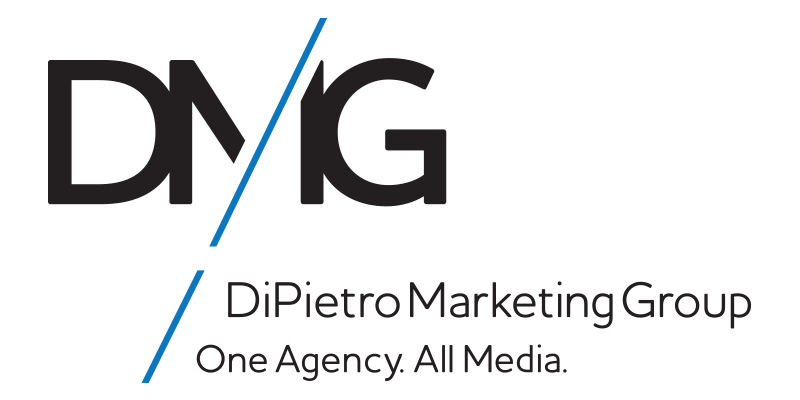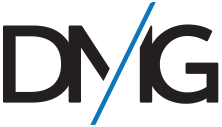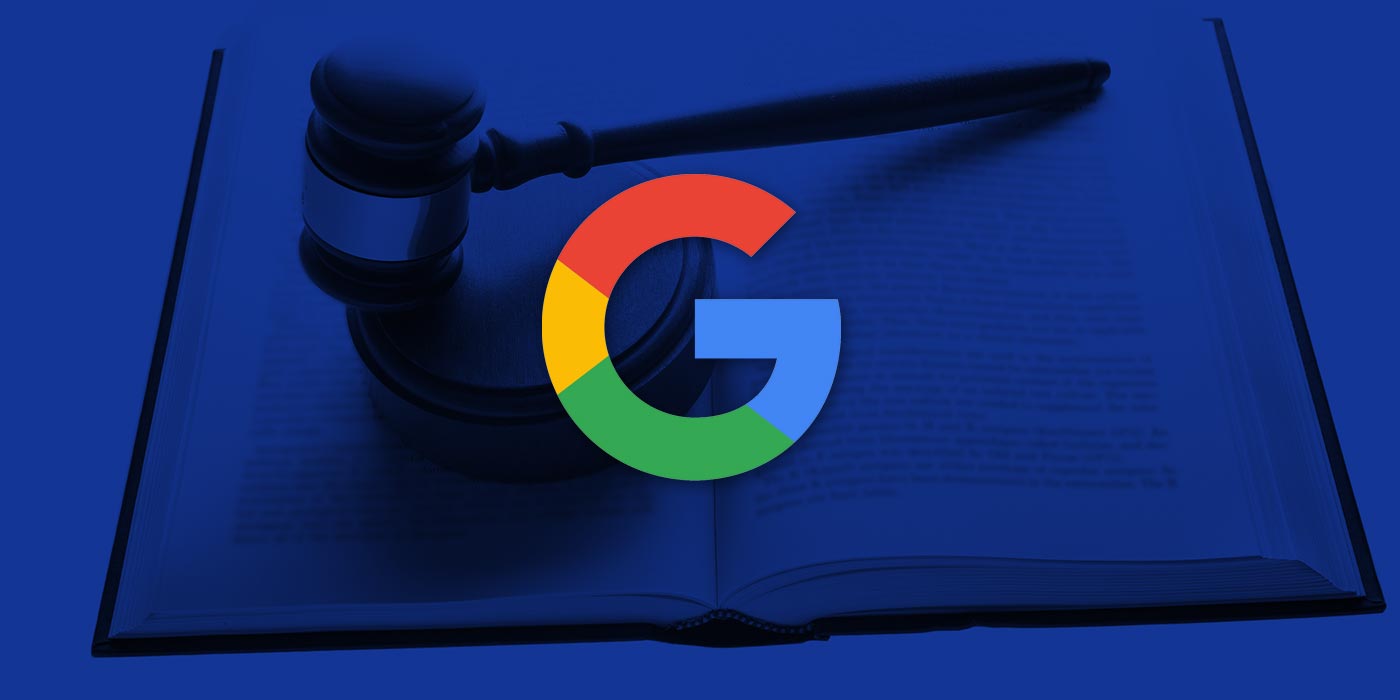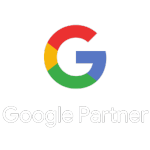Competing In Google Ads In 2019
2018 brought about a number of big changes for Google Ads. The first being the complete rebranding of the platform from the old Google AdWords to what is now known as simply Google Ads.
There were also a number of rollouts that impacted both how campaigns were managed as well as how ads were displayed to searchers.
The big question moving forward: what trends might we see in 2019 that lawyers can take advantage of when advertising on Google to get more leads and increase business?
That, of course, is the name of the game. Especially when it comes to a legal vertical that is so fiercely competitive.
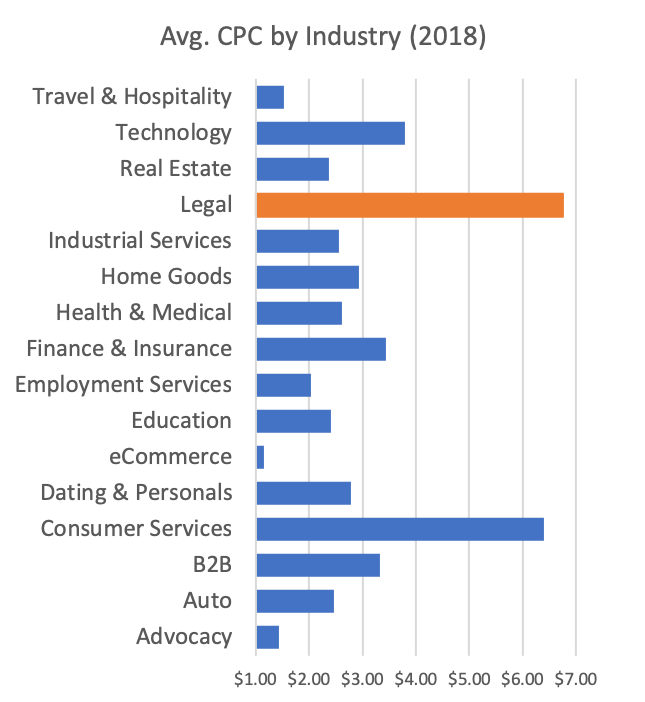
How To Compete In Google Ads For Lawyers In 2019?
Here are some of the top trends in Google Ads for lawyers in 2019, plus how to capitalize on them to make sure your firm is getting the most out of Google Ads.
Here are the top trends in Google ads for lawyers in 2019 and how to capitalize on them to make sure your firm is getting the most out of Google Ads.
- Favor Audiences Over Keywords
Audience-specific messaging, strategies, and bid management can all result in increased campaign performance and high quality leads for your law firm.
- Use Great Landing Pages
Make sure your landing pages are highly relevant to visitor’s search terms and create a great user experience in order to increase conversion rates (the percentage of users who are compelled to contact your firm).
- Optimize For Cross-Channel Activity
Potential leads are likely to use multiple different methods to research a law firm. Understanding how Google Ads plays a role in all marketing efforts will allow law firms to better optimize for the entire conversion funnel.
- Understand When (And How) To Leverage AI
Make sure your campaigns take advantage of Google’s powerful AI and ML technologies without relying on them too heavily… too little human strategy, optimization, and management can run campaigns at sub-optimal levels.
- Figure Out Your Firm’s Optimal Spend Amount
Competition on Google Ads for lawyer is fierce. Spend too little and you can’t compete; spend too much and your firm will overpay and run into diminishing returns. Use statistical models like linear regression charts to find the best ad spend level for your firm.
Trend: Favoring Audiences Over Keywords
One thing Google has gotten better and better at is collecting data. Today, with so much user-data available to advertisers, legal marketers would be insane not to leverage it.
Couple that powerful type of data with the fact that we’ve reached a day and age that’s all about the end-user and you’ll quickly come to the realization that optimizing for specific audiences is critical.
Audiences want ads & experiences catered to them.
While bidding on keywords (and all that it entails) will still be important, 2019 will likely prove to be a year that optimizing based off of audience lists surpasses the importance of actual keyword bids.
Why This Matters For Lawyers Running Google Ads
By optimizing paid search campaigns based on audience data, law firms can gain a competitive advantage over other firms by decreasing their CPA and increasing conversion rates.
A few examples of how are listed below…
- Optimizing based off of demographic data (are older age groups or younger age groups more likely to hire your firm?)
- Optimizing based off of income level (are you more profitable when doing high-asset divorces vs low income divorces?)
- Optimizing based off of interests (are people interested in cars and sports more likely to get a DUI?)
- Optimizing based off of in-market activity (are people searching for a house likely to need a real estate attorney?)
TIP! Once you start to understand more about your audience, you can optimize campaigns accordingly and gain the ability to cater to your audience in a more effective manner.
How To Capitalize In 2019 On Audience Targeting
By optimizing paid search campaigns based on audience data, law firms can gain a competitive advantage over other firms by decreasing their CPA and increasing conversion rates. Make sure your firm is targeting and optimizing for these different audience types.
Audience-specific messaging, strategies, and bid management can all result in increased campaign performance and high quality leads for your law firm.

Here are a few examples of how law firms can target and optimize for different types of audiences…
Optimize based off of demographic data.
Are older age groups or younger age groups more likely to hire your firm?
Optimize based off of income level.
Are you more profitable when doing high-asset divorces vs low income divorces?
Optimize based off of user behavior & interests.
Are people interested in cars and sports more likely to get a DUI?
Optimize based off of in-market activity.
Are people searching for a house likely to need a real estate attorney?
Trend: Landing Page Importance For Law Firms Is Growing
Google’s always placed a heavy emphasis on appeasing their end user (the person doing the searching). That’s why, in part, landing pages are so important.
We’ve seen a number of updates to how Google analyzes landing pages.
In 2018, Google rolled out its Parallel Tracking update, which helps increase User Experience (UX) when interacting with landing pages, especially while on mobile devices.
2019 won’t be any different when it comes to optimizing for UX on landing pages.
It’s important that these pages are highly relevant to the user’s search query and deliver a personal, helpful, and memorable experience.
TIP! Remember, Google has ways of measuring good vs bad user experiences, so it’s important your landing pages are performing at their best or you risk being penalized by Google.
Why Are Landing Pages So Important For Law Firms
Having landing pages that are appeasing to your user will ultimately land your campaigns in the grace and favor of the almighty Google.
Landing pages that deliver a great user experience means…
- Increased Conversion Rates
- Better Quality Scores
- Increased Ad Rank
- Lower CPA
Creating great landing pages takes a number of different disciplines usually applied by a number of different people working within a legal marketing agency.
SEMs provide important campaign data and behavior insights, art directors specializing in UX and CRO create designs that help communicate a resounding message while increasing engagement and conversion metrics, and web developers install the landing page designs with an emphasis on site speed and usability.
If your firm staffs its own marketing department, great. Else, your PPC or digital marketing agency is probably overseeing your landing pages. Either way, here are the questions to take to your team to make sure your firm has great landing pages…
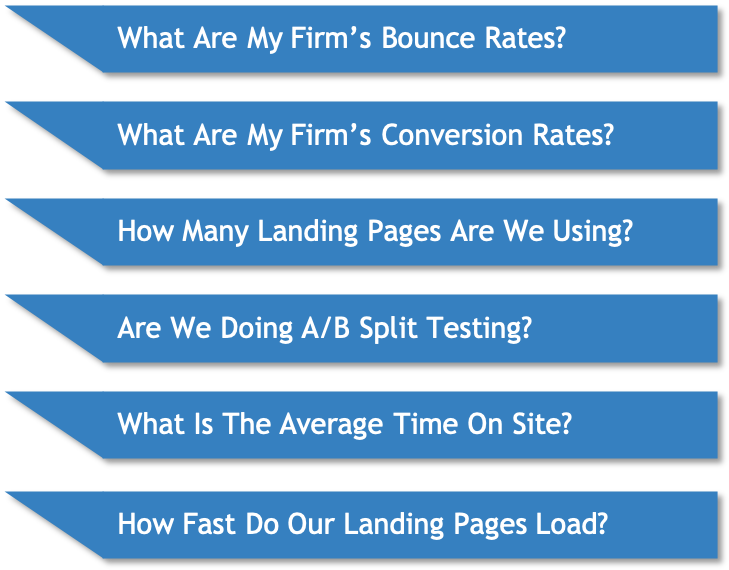
These are some great questions to ask your PPC agency about your landing page quality.
Your agency should be familiar with these questions and either know off hand, or easily be able to find out the answers.
If your landing page strategy isn’t on-par, or your firm doesn’t currently have one, you’ll want to start to stress the importance of high-quality landing pages so you’re ready for 2019.
Trend: Attribution & Cross-Channel Importance Increases For Law Firms
Marketers have long known that marketing & advertising efforts don’t occur simply in a vacuum. The path to conversion (the sequence of events leading up to someone retaining your firm) is often a long, convoluted mix of advertising efforts; each and every touch point plays a role.
As technology, multi-device usage, and data collection all continue to increase, the importance of reaching your prospects with a cohesive message AND the ability to track and measure the effectiveness of each ad channel will continue to expand heading into 2019.
Why the major increase?

There are two sources of fuel feeding the demand for cross-channel fluidity and measuring capability. First, the users’ demand for more technology, which brings with it more devices and, subsequently, more opportunities for brand interaction across different platforms.
Second, with the increases in technology, marketers have pushed harder than ever for better data to track those interactions across different platforms and advertising channels, as well as ways to reach users on all different devices in an attempt to find the most effective mix.
Why Attribution & Cross-Channel Effectiveness Matters For Law Firms
It is no longer enough to just have an online presence on multiple channels.
Digital channels need to be effectively integrated in order to have a competitive advantage.
We’ve covered this in more detail in in the Omnichannel Marketing For Lawyers blog post, and it applies to Google Ads campaigns as well.
Google Ads campaigns must allow for a cohesive experience across devices, campaigns, and campaign types in order to be successful.
By analyzing attribution models and cross-channel behaviors, your firm can better tailor ad efforts to increase conversions and brand perception.
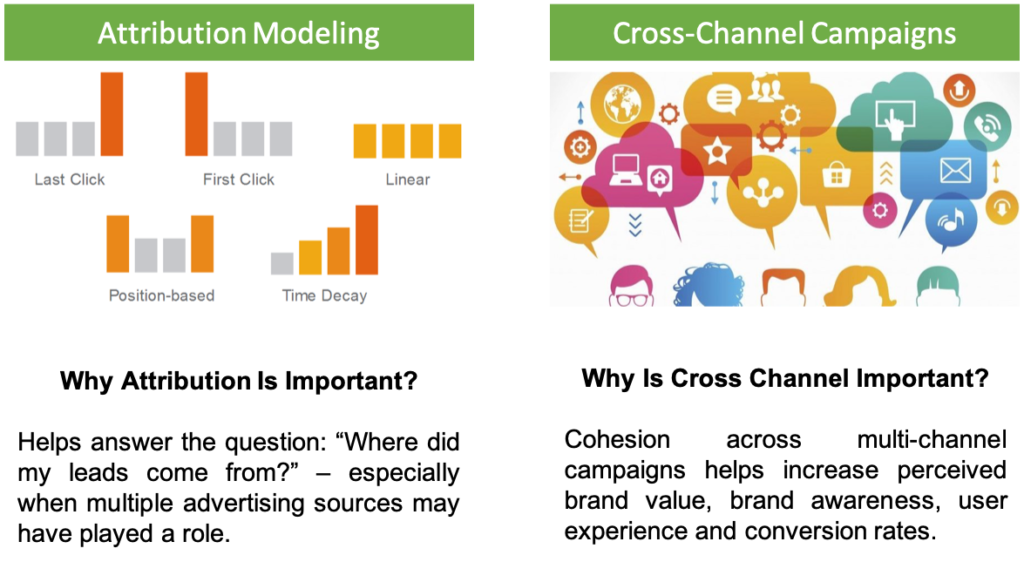
TIP! Take the time out to dig into your firm’s attribution modeling techniques (how your new leads are being tied back to the advertising source)… there are a lot of insights to be had!
How To Leverage This For Your Firm In 2019
Below is a helpful checklist for your law firm to make sure you’re ready to:
- Deliver cohesive experiences to prospects, both before, during, and after the time that they need a lawyer using Google.
- Measure brand interaction and engagement across different platforms and devices.
Your Google Ads team should be implementing this across ALL Google Ads campaign types and across ALL devices.
Make sure your firm (or your PPC agency) is collecting as much data as possible from both Google Ads and Google Analytics regarding Cross-Channel behavior(s). You’ll want to analyze these types of metrics before executing paid search campaigns. MAKE SURE THIS TYPE OF CROSS-DEVICE AND MULTI-TOUCH ATTRIBUTION TRACKING IS ENABLED! Understanding how users find and interact with your brand online will be key in 2019.
Steps To Make Sure You’re Doing This Right
- Have a plan in place to ensure that the user experience is cohesive across all touch points. Have your marketing team deliver insights as to how prospects will interact with your brand, especially when they are actively researching a lawyer. The search for a lawyer can be extensive and span touchpoints such as online legal listings, social media campaigns, SEO efforts, AND paid search campaigns… understand the role of the paid search campaigns through Google Ads in order to really improve on them in 2019.
- Make sure your PPC team is cognizant of cross-device behaviors and are optimizing accordingly across all Google Ads campaigns, including search, display, and video. Many behaviors now span smart TVs, tablets, mobile devices, and often conclude on desktops. Different device behaviors, in addition to cross-channel behaviors, play a role in a prospect’s journey to hiring an attorney.
- Be sure you’re properly attributing conversions. This is critical. Too many law firm execs simply don’t have the time or knowledge to look into how conversions are being tracked. This can lead to bad data and poor decision making relative to firm-wide advertising efforts. For example, if one person calls your firm 3x, is that being counted as one lead or three? (it’s really one lead)
- If your firm has a substantial ad spend, it may be worth looking into an agency with Advanced Analytics capabilities that can provide insights using big data sets and more complex metrics.
Trend: Google’s A.I. Is Getting Better & Better
Google’s spent a lot of time (and money) working on its AI software to improve a number of different facets regarding paid search.
Google wants its users to benefit from its AI, but it also wants paid search managers to leverage it as a tool. We’ve seen this as evidenced by so many increases in automation capabilities, smart bidding strategies, ad delivery optimizations, and so on. 2019 shows no sign of slowing down.
Why Google Ads A.I. Is Important For Law Firms
For SEMs, AI can be a gift and a curse. Using AI can significantly increase the performance of certain campaigns, as well as decrease some of the manual workload involved in tedious, day-to-day PPC management tactics.
However, it takes the right search manager to implement and oversee these AI-driven tactics. We’re not yet at a stage where AI can outperform humans and, if left alone, it’s possible for AI tactics to run PPC campaigns at a suboptimal level.
It’s important to make sure your firm is leveraging AI as its capabilities on Google continue to grow, while also making sure your PPC team isn’t running your firm’s campaigns on autopilot.
Frederick Vallaeys, CEO, Optimizer
“Automation isn’t coming. It’s already here… It won’t be a race to see whether humans or machines are best. It will be a race to see which PPC experts have the best process to leverage the machines to blow away their competition.”
How To Leverage Google A.I. When Advertising On Google For Your Law Firm
Make sure your paid search team is leaning on AI, but not relying on it. A good paid search agency knows which AI and automation techniques will work best for your firm’s campaigns, but if relied on too heavily, AI could run your account into the ground.
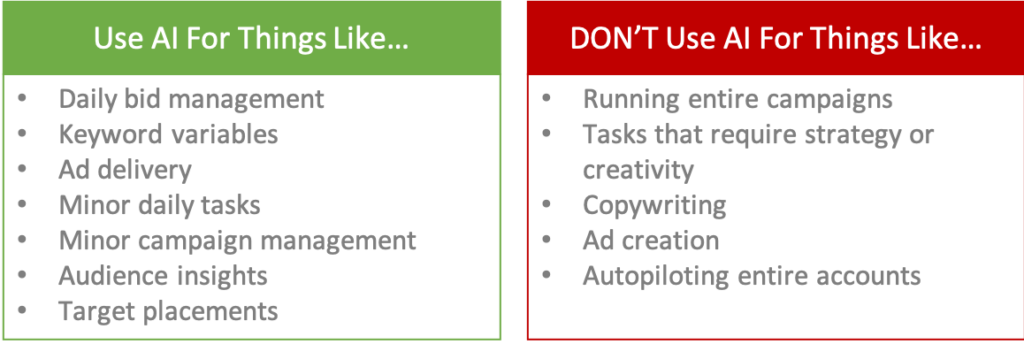
TIP! Ask your PPC team which automation techniques they are using for your firm’s campaigns. If need be, ask for a Change History Report dating back 90 days, segmenting manual versus AI-driven changes.
Trend: Google Ads Gets More Expensive For Law Firms
Advertising to people who are actively searching for the legal services your firm offers is absolutely a viable way to increase new business leads.
Unfortunately, other firms have realized this, too, and they’re all bidding and competing for the top spot on Google on lawyer-related search terms.
Of course, increasing competition at auction = increased spend for your firm.
Why This Matters For Law Firms
The evolution of digital marketing has brought with it a wide variety of different online marketing channels, strategies and tactics to keep up on. 2019 will likely prove to be no different.
But with new advertising opportunities being added, what is the appropriate marketing mix for law firms, and does PPC still play a role?
Law firms will need to figure out their ROI from Google Ads campaigns in order to decide whether or not Google is worth it for their firm in the face of increased competition.
If it is, firms will also need to calculate the appropriate spend amount to dedicate to online search advertising.
How To Capitalize On Finding The Right Ad Spend For 2019
Advanced Analytics provides a number of different solutions to finding the best advertising spend when it comes to Google Ads campaigns. It can be a helpful tool in this instance.
That being said, you’ll first want to make sure your firm has the appropriate measures in place to track leads and cases from the time a prospect first makes contact with your office.
That measurement capability will give you and your marketing department substantial insight as to your firm’s return on ad spend across different paid channels.
If you are seeing returns on your Google Ads campaigns, the next step becomes allocating an appropriate budget amount. There are a few different ways this can be done using advanced analytics practices (such as forecasting, predictive modeling, lifetime value analyses, etc.), but one great place to start is using a linear regression model.
Linear regression modeling shows the correlation between increases in ad spend and increases (or decreases) in leads.
This type of modeling helps predict an appropriate ad spend along with abilities to help identify a potential point of diminishing return.
Example: Finding Out If Increases In Google Ad Spend Results In More Law Firm Leads
DMG used a linear regression model to show a substantial correlation between increases in ad spend for Google Search Campaigns and the amount of first-time leads who contacted this particular firm. For this firm, data suggested a continued increase in ad spend was warranted.
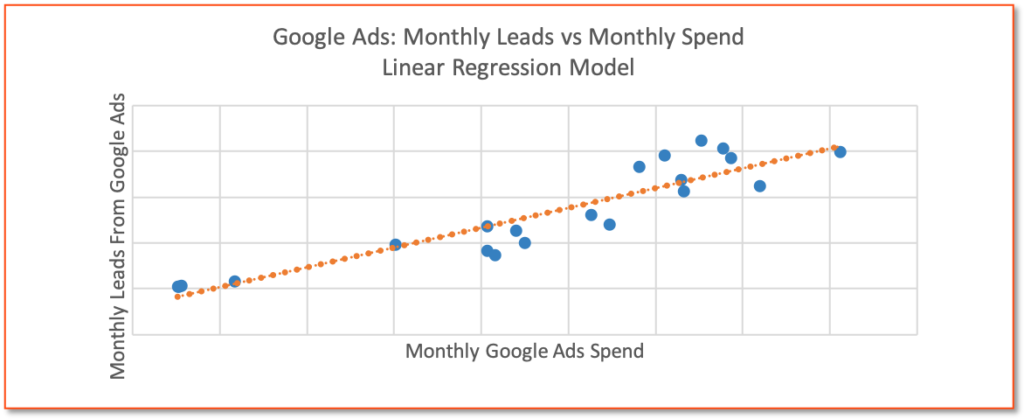
Recap…
Favoring Audiences Over Keywords
The focus in 2019 will be less on keywords and more on your audience. Make sure you’re collecting audience data and optimizing campaigns based on audience insights that prove helpful to your firm.
Understand When (And How) To Leverage AI
AI is here and it’s safe to say it’s here for good. Make sure your paid search team is taking advantage of AI and automation as a tool but not relying on it entirely… manual campaign management & human strategy is still a necessity.
Optimize For Cross-Channel Activity & Measure It Accurately
The conversion funnel for hiring a lawyer can be complex, especially if you’re firm is running multiple campaigns. Make sure your campaigns are cohesive, and be sure their effectiveness is being tracked and attributed properly.
Make Sure You’ve Got Great Landing Pages
Google continues to put the user first, as they should. 2019 will not be any different. Make sure your firm is using strategic, helpful, and highly relevant landings pages to comply with Google trends and increase conversion rates.
Figure Out Your Firm’s Optimal Google Spend Amount
Google’s getting increasingly expensive for law firms, but it’s still a great source for increasing quality leads. Use advanced analytics tools like linear regression modeling to find your firm’s most effective spend level in order to compete.
